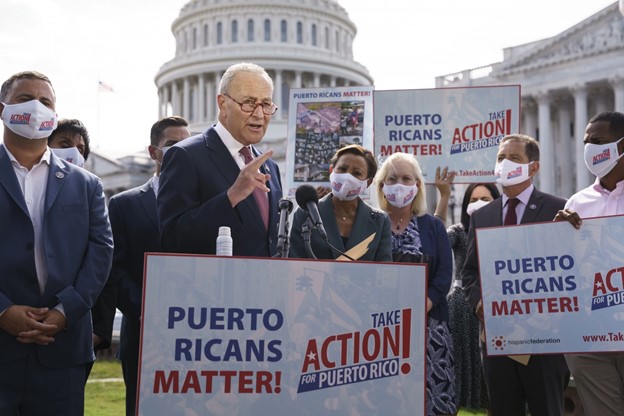
This column was first published on RealClearPolitics
The United States was founded on the premise that taxation without representation is tyranny – not democracy. This week, that basic premise was once again denied to the people of Puerto Rico when the U.S. Supreme Court opted to continue the systemic discrimination of Puerto Ricans (who are American citizens) with a ruling that stipulates that Congress can exclude them from some federal disability benefits available to those who live in the 50 states and the District of Columbia.
This ruling is just another reason why LULAC, the oldest and largest Latino civil rights organization in the country, stands in favor of Puerto Rican statehood. Only then will the over 3.2 million American citizens in Puerto Rico cease to be treated as second-class citizens – simply because of where they reside.
In addition, the federal government extracts federal income taxes from Puerto Rico residents who work for the federal government, including members of the U.S. Armed Forces; who do business with the federal government; who earn income from sources outside Puerto Rico; and from Puerto Rico-based corporations that intend to send funds to the U.S.
From 1998 until 2006, Puerto Rico residents paid more in federal taxes every year than the residents of six U.S. states, consistently contributing more than $4 billion annually in federal taxes and impositions into the government’s coffers.
The only path to full and permanent equality for millions of U.S. citizens living on the island is through statehood, because only then will the people of Puerto Rico be guaranteed equal treatment as first-class citizens. We cannot continue to fight for the Latino community’s rights on the mainland while ignoring the island’s dire needs and systematic discrimination at the hands of our own government, as demonstrated by the recent SCOTUS ruling.
Puerto Rico residents have been American citizens for more than 100 years and have never experienced full constitutional rights. In the last decade alone, the people of Puerto Rico have voted three times (2012, 2017, and 2020), rejecting the current colonial status and reaffirming their desire to be admitted as a state. More than 235,000 have served in the U.S. military and yet continue to be denied the most basic rights.
Puerto Rico is grotesquely overlooked by investors, due to a sporadic and piecemeal approach of government funding which is never guaranteed. This volatility has turned the island into an investment pariah, keeping investors away and devastating the economy.
Furthermore, U.S. citizens living on the island are not even allowed to vote in presidential elections and have no voting representation in the House or the Senate. Nonetheless, with strong visibility and supportive leadership, we have a window of opportunity to advance this cause.
A bipartisan group in Congress, led by Florida Democrat Rep. Darren Soto and Resident Commissioner Jennifer González-Colón, Puerto Rico’s lone non-voting representative, introduced H.R. 1522, the only bill before Congress with a clear path to resolve the question of Puerto Rican status. The legislation outlines a clear, constitutional process to admit the island into the Union as a state. A companion bill, S. 780, has been introduced in the Senate.
Since then, it has attracted supporters on both sides of aisle from every region of the country. These supporters not only include Floridians such as Republican Rep. Mario Diaz Balart and Democrat Debbie Wasserman Schultz, but members as varied as California Democrat Eric Swalwell, a House impeachment manager and 2020 presidential candidate, to New York Republican Rep. Elise Stefanik, a pro-Donald Trump member of the House GOP leadership.
Similarly, a disparate group of former governors and state leaders from around the country have stood up, shining a spotlight on the inequities between American citizens.
At its core, this is a clear right – U.S. citizens deserve the same rights no matter where they live. Puerto Ricans have been denied this for over a century and deserve a permanent solution and a fair shot at a prosperous life at home as first-class American citizens.
Puerto Ricans can’t achieve statehood alone. At a time when the world faces a struggle between democracies and autocracies once again, there can be no better democratic expression of what the U.S. should and can be than urging Congress to vote for statehood.

Recent Comments